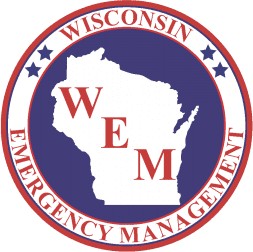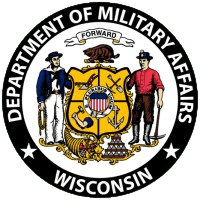Date: 03/17/2025
Contact: dmawempio@widma.gov
GREEN BAY, Wis. – The importance of preparing for tomorrow’s challenges and fostering collaborations between agencies, programs, and sectors were two key messages shared during the 2025 Wisconsin Governor’s Conference on Emergency Management and Homeland Security in Green Bay, March 10-12.
The conference, in its 57th year, was held at the Oneida Casino Hotel in Green Bay. Being held on tribal lands for the first time, there were some unique components included to honor the location. The Oneida Nation Veteran Affairs Committee presented the flags, the Medicine Bear Drum Group performed, and Oneida Nation Councilman, Marlon Skenandore, shared more information about the community, helped connect the attendees to the space they were in, and invited them to visit the Oneida Nation outside of the conference.
Pre-conference training on March 10 allowed participants a full day to deep dive into topics such as tornado awareness, interoperability, community-based planning, and more before the general session began the following day. Over the course of two days, keynote speakers and breakout sessions went over a variety of topics, including those that may more specifically align with attendees’ interests or experiences, such as health or business resiliency. The theme for this year’s conference was “preparing for tomorrow’s challenges.”
“It’s difficult to spend a lot of energy thinking about future challenges when we are working so hard to manage today’s. But tomorrow’s challenges will be here before we know it, and we always need to be planning and preparing for what lies ahead,” said Wisconsin Emergency Management Administrator Greg Engle. “One of the most important ways that we do that is through building partnerships. Partnerships are the foundation of everything we do to keep out communities safe.”
“We’ve seen the impact of our partnerships on a larger scale, such as with the successful coordination of the Republican National Convention,” said Brig. Gen. David May, Wisconsin’s interim adjutant general. “We have also shown our ability to support not just our state but nationwide. Wisconsin deployed resources to North Carolina and Florida to assist with Hurricane response and recovery efforts, including members of Wisconsin Task Force 1 and Wisconsin Emergency Management.”
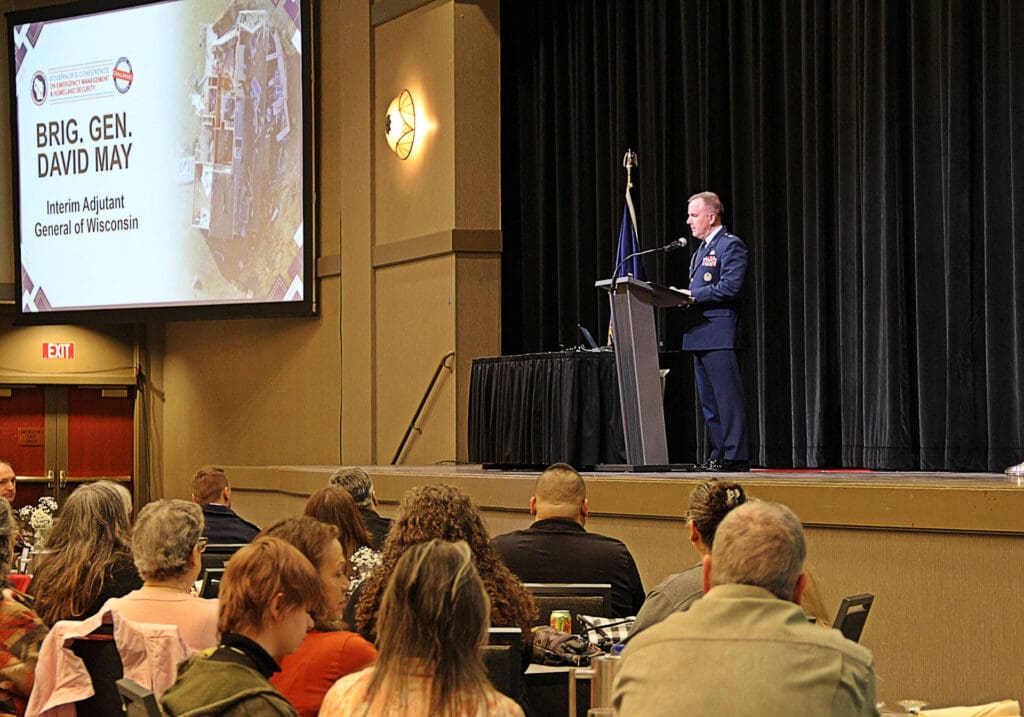
One of the highlights of the conference are the Governor’s Conference Awards. They are presented annually to recognize three people who have made great contributions to the fields of emergency management and homeland security.
Dawn Robinson, the Emergency Management Program Assistant at the Oneida County Sheriff’s office, received the Mentorship Award. Robinson was recognized for her ability to guide her mentees as they gain a better understanding of grant procurement, regulatory compliance, and stakeholder engagement. She had the following advice for those getting into emergency management.
“Never stop learning, never stop asking questions, share your knowledge with others,” said Robinson. “Together, collectively, we can build a better community and be more resilient.”
The Service Award, which goes to someone who demonstrates innovative approaches, leadership skills, and unwavering dedication, was presented to Ben Warrington, Emergency Management Coordinator at Menominee Indian Tribe of Wisconsin. He was nominated for not only his steadfast presence in the Menominee Nation, but his impacts that reach outside of their borders. He was instrumental in the fight against the opioid crisis and led several innovative projects, including installation of several emergency backup generators at critical tribal facilities and building a tornado safe room.
“I am amongst a lot of great people, so to be selected is amazing,” said Warrington. “I want to make sure I give credit where it is due, I couldn’t do any of this on my own. We’ve had a lot of support from the tribal community, emergency management leaders across the state, FEMA, and others along the way.”
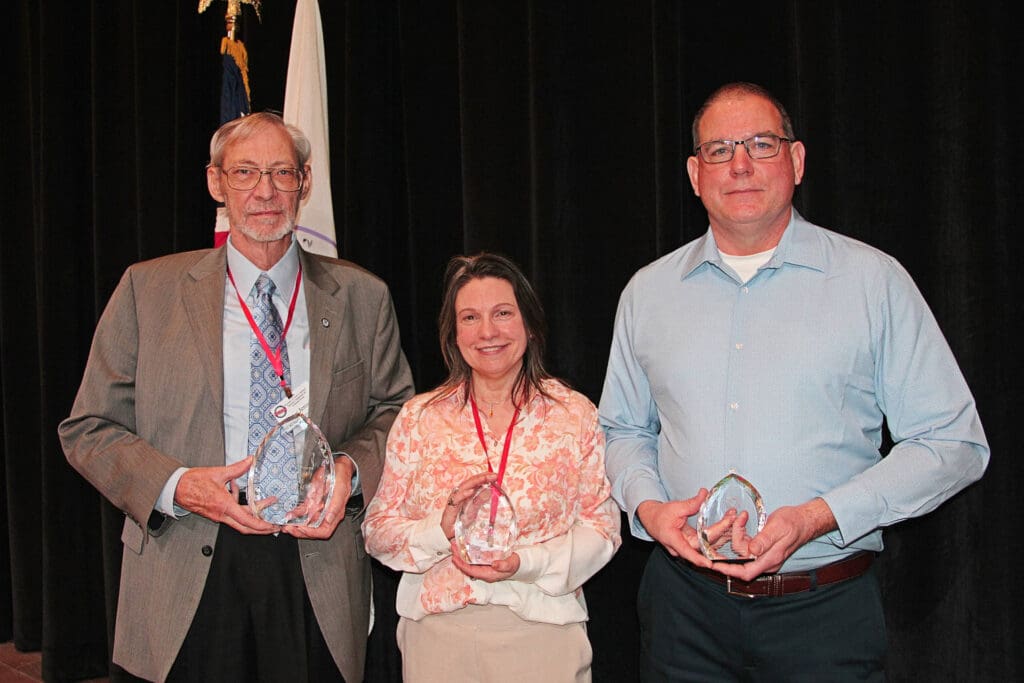
Peter Jensen, deputy team leader of the Southeast Wisconsin Incident Management Team, was honored with the Lifetime Achievement Award. His service has spanned more than five decades He worked for the American Red Cross and served as the Emergency Management Director for Racine County. He has also spent more than 17 years as a member of the Operations and Planning Cadre with FEMA’s Disaster Response, sharing his expertise at some of the most devastating incidents in the country, including the World Trade Center terror attack.
“I have a little reluctance accepting this award as an individual because emergency management is never a ‘me program,’ it’s a ‘we program,’” said Jensen. “You learn very quickly it’s we who write the plans, we who exercise, we who train, and we who pray every night we won’t receive a devastating call. When a tornado comes, or the floodwaters come, and we get that call, we become the frontline defense for our communities. It’s a rewarding career, it’s a challenging career, but always remember, it is never an individual effort.”
There were three keynote presentations at this year’s conference. Kristy Roschke, executive director of McGee Applied Research Center for Narrative Studies, looked at the growing skepticism between government officials and the public during an incident. One way to combat that was to build community trust and resilience through media literacy.
“Maybe you’re not going to be out there with a camera, reporting for the news directly, but somehow, someway you are responsible for communicating critical information to people so that they can make quick, useful, and helpful decisions,” said Roschke. “We need to be able to help people make fast decisions, and I believe that’s everyone’s jobs in this room.”
This year’s conference also featured a tribal panel discussion on emergency management, highlighting unique challenges in tribal communities. The panelists included Ben Warrington, Emergency Manager for the Menominee Indian Tribe, Kaylynn Gresham, Emergency Management Director for the Oneida Nation, Tavia James Charles, Emergency Management Coordinator for the Oneida Nation, and Kevin Scholze, Emergency Manager for the Ho-Chunk Nation. Attendees were able to learn about various designations tribal lands can have and what that means for their jurisdictions and recent emergency management success before they were able to ask the panel questions.
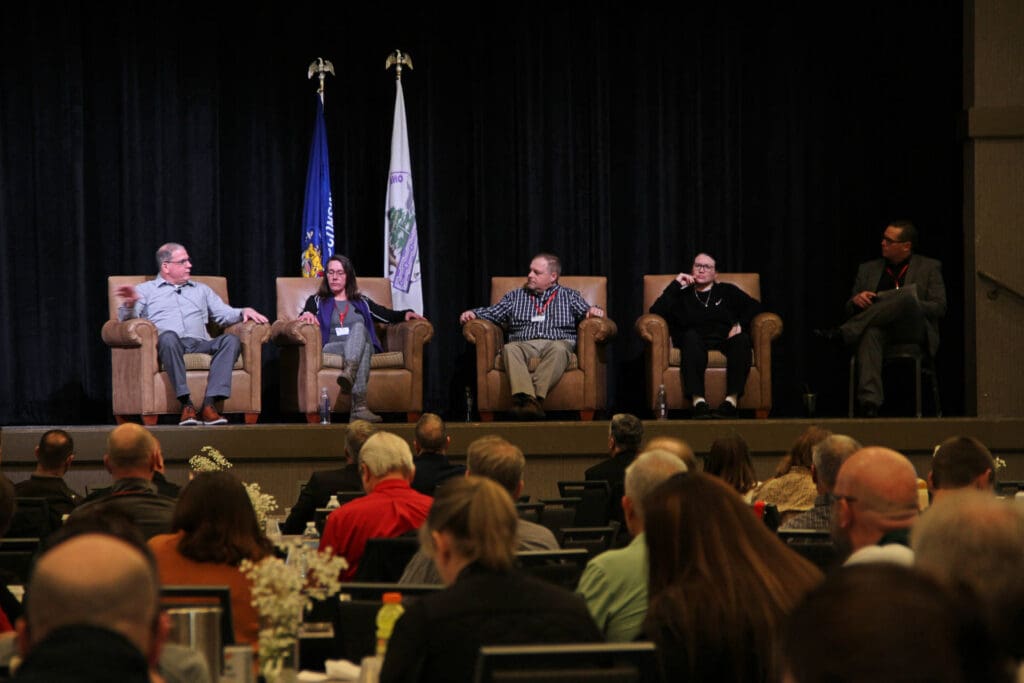
Robert Payne, Federal Bureau of Investigation (FBI) Special Agent in Charge served as the final keynote speaker of the 2025 conference. He shared the types of issues the FBI may handle, how those issues overlap with emergency management, and current trends in FBI investigations.
Nearly 400 people attended the 2025 conference, including the 19 recent graduates of the Certified Emergency Manager Basic Program, a program that takes nearly 200 hours to complete on top of their day-to-day responsibilities. Next year’s conference will take place March 23-25, 2026, at the Marriott Madison West in Middleton.
About Wisconsin Emergency Management
Wisconsin Emergency Management (WEM) is a division of the Wisconsin Department of Military Affairs. Its mission is to build capabilities and coordinate resources to support a safe and resilient Wisconsin. WEM assists communities to prepare for, respond to, and recover from emergencies, and supports long-term disaster risk reduction throughout Wisconsin. Visit wem.wi.gov for more information.
